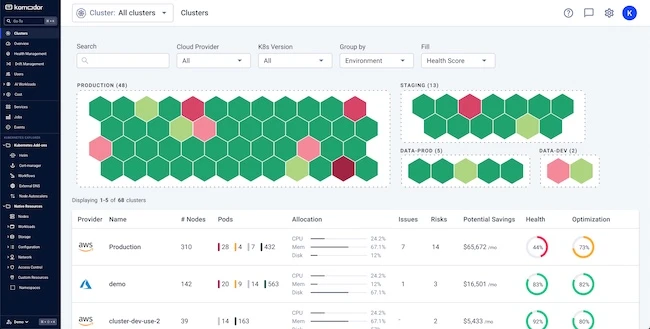Komodor’s self-healing capabilities remediate issues with or without a human in the loop
Komodor released autonomous self-healing and cost optimization capabilities that simplify operations for SRE, DevOps, and Platform teams managing large-scale Kubernetes environments.

Powered by Klaudia, purpose-built agentic AI, the Komodor platform can automatically detect, investigate, and remediate issues, with or without a human in the loop, and optimize resource utilization.
Managing Kubernetes and cloud-native infrastructure at scale has become increasingly complex. Industry research shows that 88% of technology leaders report rising stack complexity, and 81% say manual troubleshooting detracts from innovation. This growing operational burden makes it harder for teams to optimize resources. As a result, cloud waste often exceeds 30% of total spend due to misconfigurations and unused capacity that go unnoticed until performance issues arise.
Klaudia, Komodor’s agentic AI technology, bridges this gap with detection, root cause analysis, and automated remediation of issues based on deep Kubernetes expertise. Trained on telemetry from thousands of production environments, Klaudia has been proven accurate across thousands of incidents, the essential first step in any autonomous workflow. By pairing domain intelligence with trusted automation, Klaudia minimizes downtime, prevents recurring failures, and sustains reliability at scale.
“In our journey to push the boundaries of platform engineering through agentic AI and Internet of Agents, we’ve experienced the impact of autonomous collaboration across infrastructure layers as part of our CAIPE and AGNTCY initiatives,” said Hasith Kalpage, Director, Platform Engineering & CISO, at Cisco.
“Komodor makes our developers’ lives easier and lightens the load on our SRE team with an estimated 40% reduction in tickets. Our platform has been collaborating directly with Komodor’s Klaudia AI to make higher-order Kubernetes deployments smoother, autonomously troubleshooting issues and accelerating MTTR by over 80 percent.”
Automating resilience
Powered by Klaudia Agentic AI, the Komodor platform continuously monitors workloads, applies reasoning and causality to identify anomalies, and automatically remediates issues in alignment with enterprise policies. Key capabilities include:
- Autonomous self-healing with a human-in-the-loop option to resolve common failures such as pod crashes, misconfigurations, and failed rollouts before they escalate into outages.
- Active guardrails that let teams define and scope automation based on pre-defined levels to ensure actions stay within desired operational boundaries.
- Iterative learning loops driven by continuous health checks and user feedback, enhancing the platform’s ability to detect, investigate, and remediate issues with ever-growing precision.
- Explainable AI makes every action transparent and traceable. By explaining what happened, why it happened, how it was fixed, and the current system state, ensuring Klaudia acts as a trusted co-pilot, not a black box.
“Reliability engineering has always been reactive. With autonomous self-healing, we are flipping the script on the traditional management model so organizations can move from firefighting to proactive resilience,” said Itiel Shwartz, CTO of Komodor. “Due to the accuracy of our Klaudia Agentic AI technology, we enable enterprises to keep clusters and workloads healthy, and cut operational costs, with little or no manual effort.”
Cost optimization on auto-pilot
Ensuring uptime and service continuity is essential to protect revenue and customer trust, but optimizing costs has become just as critical in large-scale, cloud-native environments. Research shows that 65% of workloads consume less than half of their requested compute and memory resources, creating significant inefficiencies.
Komodor’s new autonomous cost optimization capabilities address this by:
- Dynamically right-sizing workloads to balance cost, performance, and reliability.
- Intelligently scheduling pods to avoid bin-packing restrictions, idle resources, and unnecessary scaling.
- Preventing reliability risks that often arise from static or overly aggressive scaling policies.
- Using PodMotion to seamlessly move pods and its state across nodes with zero downtime, helping organizations cut costs, boost efficiency, and handle infrastructure events without disrupting applications.
Built on proven enterprise experience
Komodor’s evolution into an AI-powered SRE platform is grounded in five years of production experience supporting dozens of large enterprises, including multiple Fortune 500 organizations, running Kubernetes at scale. This deep operational history has trained the Klaudia agentic AI technology with rich, mission-specific context, enabling precise, trusted automation across detection, diagnosis, remediation, and optimization.
The platform is fully enterprise-ready, with robust security and compliance capabilities such as RBAC, SSO, SAML, SCIM, audit logging, and certifications including GDPR and SOC 2 Type II.
Availability
The Komodor Platform with Autonomous AI SRE capabilities is available immediately from Komodor and its business partners worldwide.